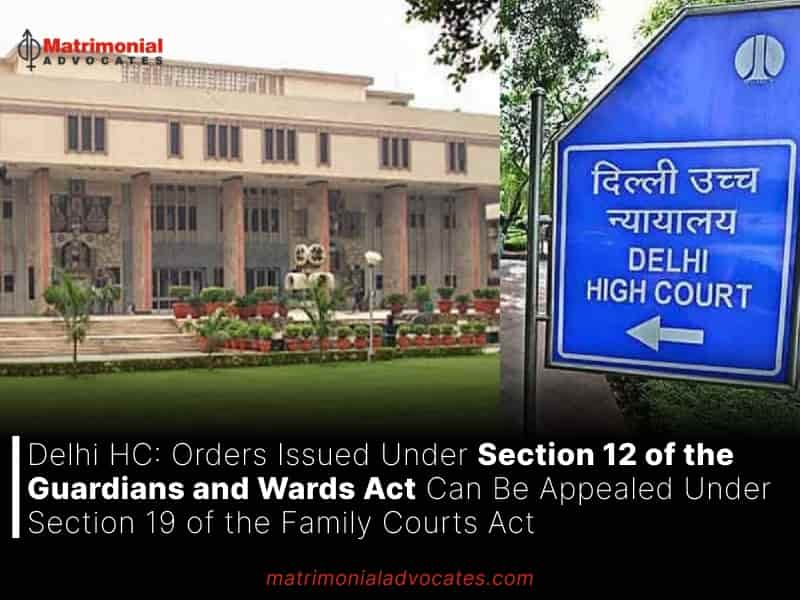
The Delhi High Court determined that orders made under Section 12 of the Guardians and Wards Act, 1890 (GW Act) are appealable under Section 19 of the Family Courts Act, 1984 (FC Act). A Full Bench was constituted by the Chief Justice in response to a referral order issued by the Division Bench in a matrimonial matter.
The Bench comprising Justice Rekha Palli, Justice Jasmeet Singh, and Justice Amit Bansal observed, “… we have no hesitation in agreeing with the appellant and the learned Amicus Curiae that the decision in Col Ramesh Pal (supra), wherein it was held that an order passed under Section 12 of the GW Act would not be appealable under Section 19 of the FC Act does not lay down correct law. We, consequently, answer this reference by holding that orders passed under Section 12 of the GW Act would be appealable under Section 19 of the FC Act.”
In this case, the Division Bench, while considering an appeal brought by the mother of a minor child, expressed its reluctance to accept the ruling in Colonel Ramesh Pal Singh v. Sugandhi Aggarwal, MAT.APP.(F.C.) 211/2019. This ruling indicated that an order made under Section 12 of the GW Act during ongoing Family Court proceedings is classified as an interlocutory order and thus not subject to appeal under Section 19(1) of the FC Act. The Court observed that another Division Bench had reached a different conclusion regarding the appeal’s scope under Section 19(1) of the FC Act in Manish Aggarwal v. Seema Aggarwal, (2012) 192 DLT 714 (DB). Consequently, the Court determined that the decision in Colonel Ramesh Pal required examination by a Larger Bench.
Given these circumstances, the Full Bench was constituted to assess the legitimacy of the decision in Colonel Ramesh Pal. The order in question was issued following a request from the minor child’s father, asking for the child to be admitted to one of three local schools. This arrangement would enable the father to have temporary custody of the child each day after school, rather than sending the child to a crèche while the mother was at work.
The High Court after hearing the contentions of the counsel, noted, “… the FC Act still does not define as to what would be an interlocutory order. In these circumstances, there is no reason why the provisions of Section 19 of the FC Act must not be purposively interpreted to include within its ambit all those orders which touch upon matters of moment and have trappings of finality. An order under Section 12 of the GW Act which entitles the Court to grant temporary custody of the child to one of the parents would definitely be an order passed after evaluating the respective contentions of the parties and would necessarily affect not only their rights but also those of the minor child.”
The Court further explained that concluding that such an order is outside the scope of Section 19(1) of the FC Act would not only unduly restrict the scope of this appellate provision but also impede the Court’s ability to exercise parens patriae jurisdiction in the best interests of the minor child.
“As we have already held hereinabove that the powers exercisable under the FC Act, could not be controlled by the provisions of other statutes, we are of the view that the criteria prescribed under the GW Act, could not be applied to test whether an order should be treated as an interlocutory order for the purposes of the FC Act”, it said.
The Court emphasized that merely designating an order under Section 12 of the GW Act as an interlocutory order does not warrant its classification as such under the FC Act, which was enacted 94 years later and intended to provide a wider scope for appeals.
“In our view, in every case, when an order passed by the Family Court, is taken in appeal before the High Court, it would be incumbent upon the Court to examine the nature of the impugned order in its entirety to determine whether the same is in the nature of an adjudicatory order which decides valuable rights of the parties. Whenever the Court finds that an order touches upon the vital rights of the parties in contradistinction to an order which is merely a procedural order, an appeal ought to be entertained, irrespective of the fact that the order was passed during the pendency of the proceedings before the learned Family Court”, it also observed.
Accordingly, the High Court answered the reference.





